Daily Vocabulary Words: List of Daily Used Words in Leading Indian Newspapers
Hi there. Welcome to this special section @ Wordpandit. Our endeavour here is straightforward: highlighting daily vocabulary words that you would come across in leading newspapers in the country. We have included the following newspapers in our selection:
• The Times of India
• The Economic Times
• Hindustan Times
• Mint
• Indian Express
We are putting in extensive work to develop your vocabulary. All you have to do is be regular with this section and check out this post daily. This is your repository of commonly used words; essentially, we are posting a list of daily used words. Hence, this has significant practical application as it teaches you words that are commonly used in leading publications mentioned above.
Visit the website daily to learn words from leading Indian newspapers.
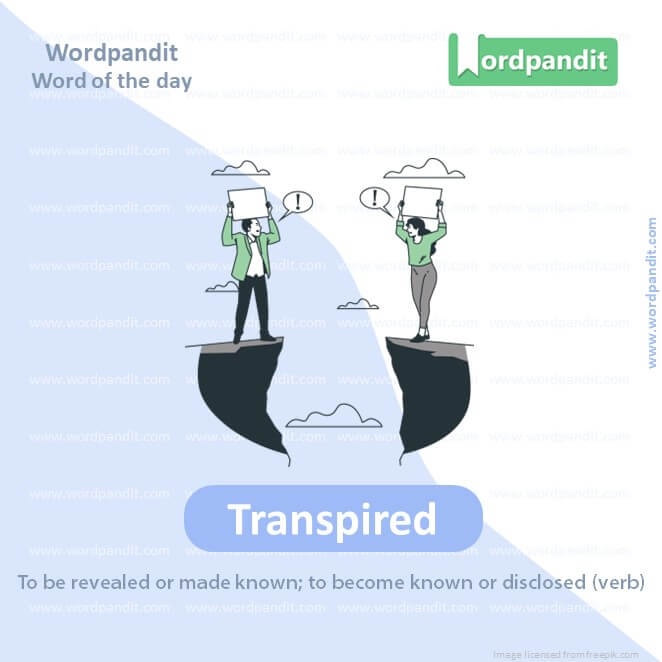
WORD-1: Transpired
CONTEXT: Only in a span of a few months, multiple meetings have transpired between the two leaders, and Modi’s visit to Paris last July saw the launch of an ambitious Horizon 2047 Roadmap.
SOURCE: Hindustan Times
EXPLANATORY PARAGRAPH: Have you ever played a game of telephone where a message gets passed around, and by the end, it’s different from where it started? Well, “transpired” is like that. It means when things happen or are said, and then other things happen afterward as a result.
MEANING: To be revealed or made known; to become known or disclosed (verb).
PRONUNCIATION: tranz-SPYRD
SYNONYMS: occurred, happened, unfolded, ensued, occurred
USAGE EXAMPLES:
1. It transpired that the cake was missing from the kitchen after the party.
2. After the meeting, it transpired that there were still many unanswered questions.
3. It transpired from the conversation that they had different opinions on the matter.
4. When the truth finally transpired, everyone was shocked.
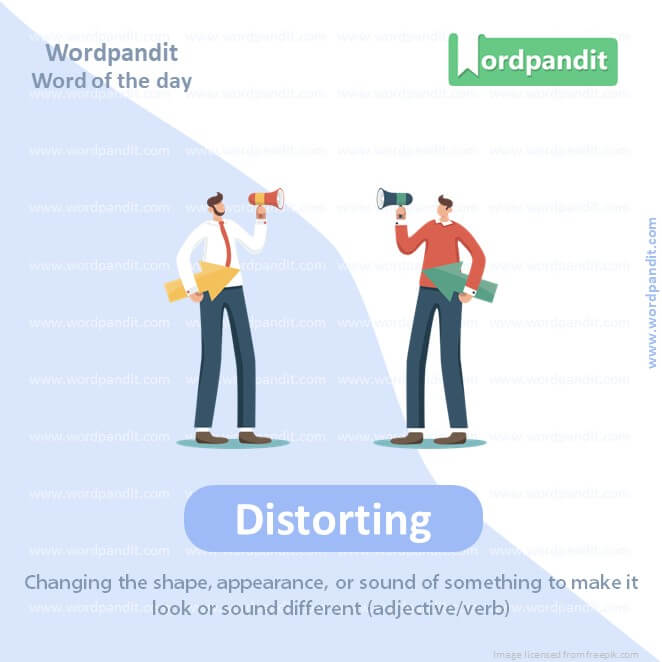
WORD-2: Distorting
CONTEXT: Subsidies usually end up distorting economic incentives and almost always do not benefit those they are aimed to help.
SOURCE: Hindustan Times
EXPLANATORY PARAGRAPH: Imagine looking at yourself in a funhouse mirror where your reflection looks all wobbly and weird. That’s kind of like what “distorting” means. It’s when something is changed or twisted from how it’s supposed to be, making it look or seem strange.
MEANING: Changing the shape, appearance, or sound of something to make it
look or sound different (adjective/verb).
PRONUNCIATION: dih-STOR-ting
SYNONYMS: warping, twisting, deforming, contorting, misshaping
USAGE EXAMPLES:
1. The funhouse mirrors were distorting everyone’s reflections, making them look funny.
2. The artist used techniques to deliberately distort the shapes in his painting.
3. The old photograph had started distorting, making it difficult to recognize the people in it.
4. His anger was distorting his judgment, causing him to make rash decisions.
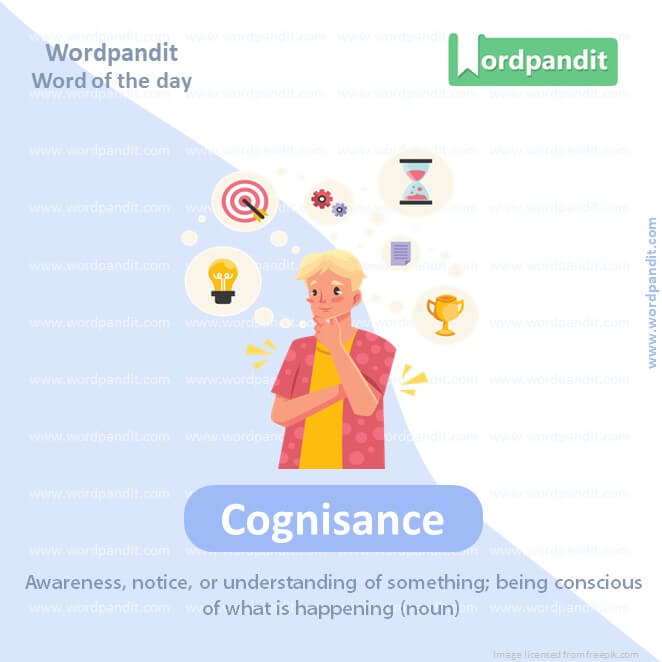
WORD-3: Cognisance
CONTEXT: The court’s order was timely. As far too often in such cases, courts only take cognisance after the demolitions and evictions have been conducted.
SOURCE: Hindustan Times
EXPLANATORY PARAGRAPH: Have you ever played hide and seek where you need to keep track of where everyone is hiding? Well, “cognisance” is like that, but instead of people, it’s about being aware or knowing about something.
MEANING: Awareness, notice, or understanding of something; being conscious
of what is happening (noun).
PRONUNCIATION: KOG-nuh-zuhns
SYNONYMS: awareness, consciousness, understanding, knowledge, recognition
USAGE EXAMPLES:
1. The company had no cognisance of the safety hazards in the workplace.
2. She gained cognisance of the issue only after it became a serious problem.
3. The new policy aimed to increase cognisance among employees about cybersecurity threats.
4. It is important to have cognisance of your surroundings when walking alone at night.
WORD-4: Spillage
CONTEXT: The cost of one unit is ₹ 4 as compared to about the ₹ 6.5 average cost of power procured in India after factoring in transmission losses, carriage charges, and spillage in the networks.
SOURCE: Hindustan Times
EXPLANATORY PARAGRAPH: Picture accidentally knocking over a glass of milk, and it spills all over the table. That’s what “spillage” is. It’s when something liquid gets out of its container and makes a mess.
MEANING: The act of liquid escaping or overflowing from its container and making a mess (noun).
PRONUNCIATION: SPIL-ij
SYNONYMS: spill, leakage, overflow, splatter, runoff
USAGE EXAMPLES:
1. The spillage of oil from the tanker polluted the river.
2. Clean up the spillage on the floor before someone slips and falls.
3. The spillage of ink from the pen ruined the document.
4. The spillage of water from the bathtub flooded the bathroom floor.
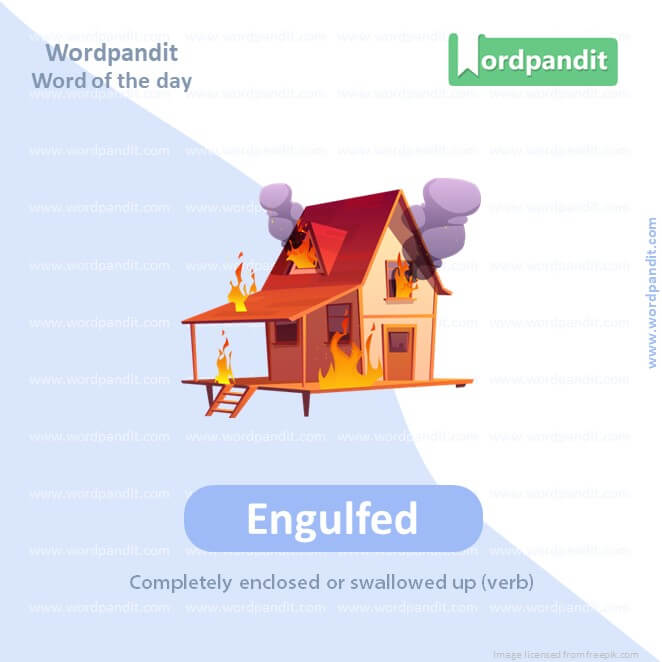
WORD-5: Engulfed
CONTEXT: The India-France partnership is a force for global good in a volatile world engulfed in multiple crises.
SOURCE: Hindustan Times
EXPLANATORY PARAGRAPH: Think of being swallowed by a giant wave at the beach. That’s what it means to be “engulfed.” It’s when something gets completely surrounded or swallowed up by something else, like a big hug from the ocean.
MEANING: Completely enclosed or swallowed up (verb).
PRONUNCIATION: en-GUHlft
SYNONYMS: consumed, swallowed, immersed, enveloped, overwhelmed
USAGE EXAMPLES:
1. The car was engulfed in flames after the accident.
2. The city was engulfed by a thick fog, reducing visibility.
3. She felt engulfed by the sadness of losing her pet.
4. The small boat was engulfed by the giant waves during the storm.
WORD-6: Spanning
CONTEXT: A multi-faceted partnership spanning cooperation in a range of sectors, defence remains at its core.
SOURCE: Hindustan Times
EXPLANATORY PARAGRAPH: Imagine drawing a line from one end of the room to the other. That’s what “spanning” means. It’s when something stretches or extends all the way from one point to another, like a bridge connecting two sides of a river.
MEANING: Stretching or extending all the way from one point to another (verb).
PRONUNCIATION: SPAN-ing
SYNONYMS: extending, stretching, reaching, covering, traversing
USAGE EXAMPLES:
1. The bridge spanning the river is a popular spot for tourists.
2. Her influence in the community spans several decades.
3. The forest spanning the mountains is home to diverse wildlife.
4. The book series spans multiple genres, appealing to a wide range of readers.
WORD-7: Infructuous
CONTEXT: The case infructuous (this was what happened, to a large extent, in the notorious Jahangirpuri demolitions in 2023). By ensuring that relevant orders were passed while the petitioners’
SOURCE: Hindustan Times
EXPLANATORY PARAGRAPH: Imagine planting seeds in the ground, but no matter how much you water them, they never grow. That’s what “infructuous” means. It’s when something is done, but it doesn’t result in any success or achievement.
MEANING: Not resulting in any success or achievement despite effort (adjective).
PRONUNCIATION: in-FRUHK-choo-uhs
SYNONYMS: futile, fruitless, unsuccessful, vain, unproductive
USAGE EXAMPLES:
1. Despite their efforts, the negotiations were infructuous, and no agreement was reached.
2. His attempts to find a solution proved infructuous, leaving him frustrated.
3. The project turned out to be infructuous due to lack of funding.
4. Trying to convince her was infructuous; she wouldn’t change her mind.
WORD-8: Punitively
CONTEXT: The municipality to engage meaningfully with the residents, before punitively evicting them.
SOURCE: Hindustan Times
EXPLANATORY PARAGRAPH: When you break a rule at school, sometimes you get sent to the principal’s office or get detention. That’s because of “punitively.” It’s when something is done to punish someone for doing something wrong.
MEANING: Done in a way that punishes someone for doing something wrong (adverb).
PRONUNCIATION: PYOO-ni-tiv-lee
SYNONYMS: punitory, punitively, punitively, punitory, punitively
USAGE EXAMPLES:
1. The company was fined punitively for violating environmental regulations.
2. He was punitively punished for cheating on the exam.
3. The judge ruled punitively, imposing the maximum sentence for the crime.
4. The coach benched the player punitively for breaking team rules.
WORD-9: Stipulating
CONTEXT: The court also prevented precipitate and violent State action by stipulating that four weeks would have to be given to the inhabitants to apply for the resettlement scheme, and have their claims processed
SOURCE: Hindustan Times
EXPLANATORY PARAGRAPH: When you play a game, there are usually rules you have to follow, right? Well, “stipulating” is kind of like that. It’s when you set out or demand certain rules or conditions before something can happen or be done.
MEANING: Setting out or demanding certain rules or conditions before something can happen or be done (verb).
PRONUNCIATION: STIP-yuh-leyt-ing
SYNONYMS: specifying, specifying, requiring, prescribing, demanding
USAGE EXAMPLES:
1. The contract stipulates that the work must be completed by the end of the month.
2. She agreed to lend him money, stipulating that he pay it back with interest.
3. The rules stipulate that all participants must wear helmets during the race.
4. The lease stipulates that pets are not allowed in the apartment.
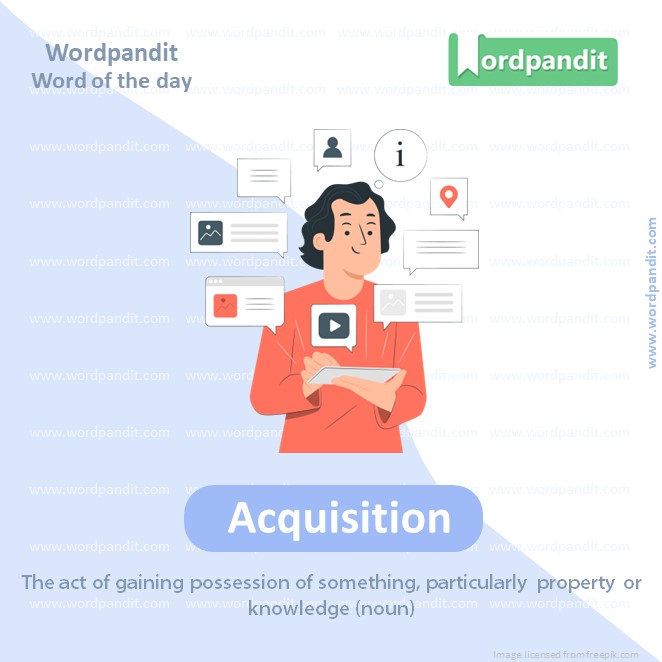
WORD-10: Acquisition
CONTEXT: Defence acquisition is a comparatively tedious process in the US compared to France’s more centralised system.
SOURCE: Hindustan Times
EXPLANATORY PARAGRAPH: Imagine collecting all the different kinds of LEGO sets or dolls. That’s like an “acquisition.” It’s when you get or gain something, like a new toy or a piece of land.
MEANING: The act of gaining possession of something, particularly property or
knowledge (noun).
PRONUNCIATION: ak-wuh-ZISH-uhn
SYNONYMS: attainment, procurement, gain, obtaining, possession
USAGE EXAMPLES:
1. The company celebrated its latest acquisition of a smaller competitor.
2. His acquisition of new skills made him a valuable asset to the team.
3. The museum’s acquisition of the rare painting was a significant event.
4. The acquisition of wealth did not bring him happiness.
Vocabulary Pronunciation
The dance of language learning comprises two inseparable partners: vocabulary and pronunciation. The rhythm of this dance is best enjoyed when both partners are in sync. Essentially, mastering ‘vocabulary pronunciation’ is key to expressing and understanding a language effectively. However, what is the ideal approach to learn ‘vocabulary pronunciation’?
Firstly, the process of learning ‘vocabulary pronunciation’ isn’t a sprint. Rather, it’s a marathon where consistency is vital. A gradual and steady pace of learning new words and their pronunciation offers enough time to effectively practice and commit them to memory.
Secondly, to master ‘vocabulary pronunciation’, go beyond written text. Dwell in the world of audible language, such as documentaries, podcasts, music, or language-learning apps that provide pronunciation guides. These memorable auditory experiences aid in refining your ‘vocabulary pronunciation’ and offer a glimpse into the authentic sounds of the language.
Another beneficial strategy for learning ‘vocabulary pronunciation’ involves the use of phonetic transcriptions. They offer systematic approaches to understanding the sound system of a language, thereby improving pronunciation.
Most importantly, do not shy away from practicing your ‘vocabulary pronunciation’. Be it in a language exchange meeting, a conversation with a native speaker, or even a self-recording session, active verbalization massively boosts your pronunciation prowess.
Lastly, always remember to train your ears as much as you train your tongue. Listening carefully to native speakers helps you capture the subtleties of ‘vocabulary pronunciation’, contributing to better delivery when you speak.
In conclusion, mastering ‘vocabulary pronunciation’ is not an overnight journey. It’s a process of intentional practice, sustained listening, conscientious reflection and active usage. As you chart this course with diligence and patience, you will witness your ‘vocabulary pronunciation’ skills blossom, leading you to communicate with greater fluency and confidence.







